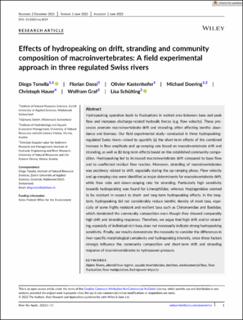Bitte benutzen Sie diese Kennung, um auf die Ressource zu verweisen:
https://doi.org/10.21256/zhaw-26616| Publikationstyp: | Beitrag in wissenschaftlicher Zeitschrift |
| Art der Begutachtung: | Peer review (Publikation) |
| Titel: | Effects of hydropeaking on drift, stranding and community composition of macroinvertebrates : a field experimental approach in three regulated Swiss rivers |
| Autor/-in: | Tonolla, Diego Dossi, Florian Kastenhofer, Olivier Döring, Michael Hauer, Christoph Graf, Wolfram Schülting, Lisa |
| et. al: | No |
| DOI: | 10.1002/rra.4019 10.21256/zhaw-26616 |
| Erschienen in: | River Research and Applications |
| Band(Heft): | 39 |
| Heft: | 3 |
| Seite(n): | 427 |
| Seiten bis: | 443 |
| Erscheinungsdatum: | 2022 |
| Verlag / Hrsg. Institution: | Wiley |
| ISSN: | 1535-1459 1535-1467 |
| Sprache: | Englisch |
| Schlagwörter: | Alpine river; Altered flow regime; Aquatic invertebrate; Benthos; Flow manipulation; Hydropower impact |
| Fachgebiet (DDC): | 333: Bodenwirtschaft und Ressourcen |
| Zusammenfassung: | Hydropeaking operation leads to fluctuations in wetted area between base and peak flow and increases discharge-related hydraulic forces (e.g. flow velocity). These processes promote macroinvertebrate drift and stranding, often affecting benthic abundance and biomass. Our field experimental study—conducted in three hydropeakingregulated Swiss rivers—aimed to quantify (a) the short-term effects of the combined increase in flow amplitude and up-ramping rate based on macroinvertebrate drift and stranding, as well as (b) long-term effects based on the established community composition. Hydropeaking led to increased macroinvertebrate drift compared to base flow and to unaffected residual flow reaches. Moreover, stranding of macroinvertebrates was positively related to drift, especially during the up-ramping phase. Flow velocity and up-ramping rate were identified as major determinants for macroinvertebrate drift, while flow ratio and down-ramping rate for stranding. Particularly high sensitivity towards hydropeaking was found for Limnephilidae, whereas Heptageniidae seemed to be resistant in respect to short- and long-term hydropeaking effects. In the longterm, hydropeaking did not considerably reduce benthic density of most taxa, especially of some highly resistant and resilient taxa such as Chironomidae and Baetidae, which dominated the community composition even though they showed comparably high drift and stranding responses. Therefore, we argue that high drift and/or stranding, especially of individual-rich taxa, does not necessarily indicate strong hydropeaking sensitivity. Finally, our results demonstrate the necessity to consider the differences in river-specific morphological complexity and hydropeaking intensity, since these factors strongly influence the community composition and short-term drift and stranding response of macroinvertebrates to hydropower pressure. |
| URI: | https://digitalcollection.zhaw.ch/handle/11475/26616 |
| Volltext Version: | Publizierte Version |
| Lizenz (gemäss Verlagsvertrag): | CC BY-NC-ND 4.0: Namensnennung - Nicht kommerziell - Keine Bearbeitungen 4.0 International |
| Departement: | Life Sciences und Facility Management |
| Organisationseinheit: | Institut für Umwelt und Natürliche Ressourcen (IUNR) |
| Enthalten in den Sammlungen: | Publikationen Life Sciences und Facility Management |
Dateien zu dieser Ressource:
| Datei | Beschreibung | Größe | Format | |
|---|---|---|---|---|
| 2022_Tonolla-etal_Hydropeaking-effect-drift-stranding-community-composition-macroinvertebrates.pdf | 10.34 MB | Adobe PDF |  Öffnen/Anzeigen |
Zur Langanzeige
Tonolla, D., Dossi, F., Kastenhofer, O., Döring, M., Hauer, C., Graf, W., & Schülting, L. (2022). Effects of hydropeaking on drift, stranding and community composition of macroinvertebrates : a field experimental approach in three regulated Swiss rivers. River Research and Applications, 39(3), 427–443. https://doi.org/10.1002/rra.4019
Tonolla, D. et al. (2022) ‘Effects of hydropeaking on drift, stranding and community composition of macroinvertebrates : a field experimental approach in three regulated Swiss rivers’, River Research and Applications, 39(3), pp. 427–443. Available at: https://doi.org/10.1002/rra.4019.
D. Tonolla et al., “Effects of hydropeaking on drift, stranding and community composition of macroinvertebrates : a field experimental approach in three regulated Swiss rivers,” River Research and Applications, vol. 39, no. 3, pp. 427–443, 2022, doi: 10.1002/rra.4019.
TONOLLA, Diego, Florian DOSSI, Olivier KASTENHOFER, Michael DÖRING, Christoph HAUER, Wolfram GRAF und Lisa SCHÜLTING, 2022. Effects of hydropeaking on drift, stranding and community composition of macroinvertebrates : a field experimental approach in three regulated Swiss rivers. River Research and Applications. 2022. Bd. 39, Nr. 3, S. 427–443. DOI 10.1002/rra.4019
Tonolla, Diego, Florian Dossi, Olivier Kastenhofer, Michael Döring, Christoph Hauer, Wolfram Graf, and Lisa Schülting. 2022. “Effects of Hydropeaking on Drift, Stranding and Community Composition of Macroinvertebrates : A Field Experimental Approach in Three Regulated Swiss Rivers.” River Research and Applications 39 (3): 427–43. https://doi.org/10.1002/rra.4019.
Tonolla, Diego, et al. “Effects of Hydropeaking on Drift, Stranding and Community Composition of Macroinvertebrates : A Field Experimental Approach in Three Regulated Swiss Rivers.” River Research and Applications, vol. 39, no. 3, 2022, pp. 427–43, https://doi.org/10.1002/rra.4019.
Alle Ressourcen in diesem Repository sind urheberrechtlich geschützt, soweit nicht anderweitig angezeigt.